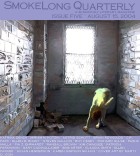How did Poseidon end up in your story?
I knew I wanted the woman in my story to encounter a mythological god to take the story to metaphorical plane. I wanted the god to represent forces larger than her. Poseidon, as ruler of the sea, best fits a major theme of the story: the sea as representative of the mind and its emotions, of the collective unconscious, and of the origin of life. He was also famous for being quite a ladies’ man and fathering many children.
What attracts you to the structure of counterpointed sections? What demands and challenges does this form put on the writer and reader?
For this story I needed a structure that could show a lifetime without bogging the reader down. For it to work, and I hope it does, each section has to offer its information in a vivid, sensual way.
The critic Louis Ruprecht argues, “The tragic vision, as opposed to our modern posture, believes in the possibility-not the inevitability-of redemption, come what may.” What’s your view on the possibility of redemption in the modern world?
Today, people are so distracted by the material world, by the ego’s cravings, that it’s more difficult, but not impossible, to achieve what is necessary for redemption: the marriage of an individual’s light and dark sides with absolute acceptance and forgiveness.
Has your belief in the inevitability of global peace been shaken these past few years? What’s it going to take to get us there?
If anything my belief in the inevitability for global peace has strengthened these past few years because of my recent willingness to examine human suffering. Throughout history, man has committed unimaginable horrors against “the other.” Not so far back, we’ve had genocides in Europe, Cambodia, Bosnia, Rwanda, Sudan, to list a few. The evolution of the human race is inevitable. The forces that propel this transformation remain a mystery, but I see evidence that this concept of “the other” is already beginning to deteriorate. Our hope for world peace comes in the annihilation of seeing ourselves as separate from each other.
A new year approaches (yikes!). So, what’s the best that 2005 had to offer in literature, web sites, music, movies, television, DVD, and the like? Also, any predictions for 2006? And we’d love to hear your New Year’s resolution.
I am the last person to comment on the best of 2005. My tastes are hopelessly un-cool. My optimistic prediction for 2006? More people will return to reading literature and buy loads of books so the writers who write them can purchase more paper.
My New Year’s resolution is usually the same: To live as mindfully as I can, in gratitude, and with grace. I’ve yet to succeed in living this way for long, but I’m convinced sometime in the future I may be able to hold it for a whole week straight.



 The SmokeLong Grand Micro Contest (The Mikey) is now an annual competition celebrating and compensating the best micro fiction and nonfiction online.
The SmokeLong Grand Micro Contest (The Mikey) is now an annual competition celebrating and compensating the best micro fiction and nonfiction online.